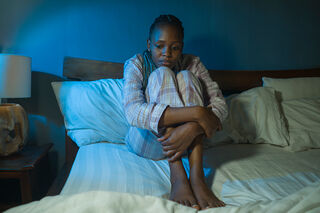Coronavirus Disease 2019
Is Covid-19 Causing a Personal Hygiene Crisis?
Why your child's refusal to brush their teeth is a big deal.
Posted February 10, 2021 Reviewed by Gary Drevitch
Just like that, it seems the ground we walked on started to shake and people went into lockdown. Many stopped showering, bathing or even washing their face regularly. And some people even stopped brushing their teeth.
It’s been almost a year since our daily routines have been replaced by virtual classrooms, grocery deliveries, exercise zoom classes, social isolation and a decline in self-care regimens. Moms and dads staying in their pajamas for days. Kids “forgetting” to brush their teeth. Bedtime rituals lost to endless hours of FaceTiming with friends and habitual. Senseless scrolling through TIK TOK blurred days from nights.
The truth is, many people struggled with taking care of their health prior to Covid-19. There are people, including children and teens, who hide in the shadows, seeking medical and mental health care only after they summoned up the courage to ask for help or someone advocates for them.
Parents, teachers and friends often dismiss or miss the signs — such as a teen who has a habit of making plans to meet friends, only to cancel at the last minute, or who are late to work or class, or appear disheveled. Maybe you couldn’t put your finger on it but they seemed disinterested, anxious, or distant.
In our frantic world, as we rush to complete work, clean our homes, and nudge our kids, we chose to overlook their behavior. After all, they are teenagers, and aren’t all teens sloppy, messy, late, angry, disconnected, and irritated at their parents? Or do we think, "They are just a kid. I never liked to shower or brush my teeth either.”

Covid-19 magnified mental health issues and created them for others. In fact, not only have we found that the virus is contagious, but the side effects — depression, anxiety, sense of hopelessness, anti-social behavior, and addictive behaviors — seem to be spreading at an alarming rate.
This past year, in my virtual practice as a child and adolescent psychotherapist and parent educator, I have observed the decline of daily personal hygiene practices in children and their parents.
I am extremely concerned about the current status of our mental health. When taking a shower, brushing teeth, even getting out of your PJ’s feels like climbing mountain, we must stop and reassess what is happening.
We are living through a historical crisis which demands our full attention and focus. It calls upon you to break through your previous parenting scripts, and to face your demons, however big or small, to bring your whole self to the challenge before you.
I am going to be direct: It is not okay for your kids to be alone in their room all day and night. It is not okay to neglect personal hygiene. It is a downhill slide that can quickly descend into a dark, murky hole.
It is your job, especially if your children are living under your roof, to help yourself in order to be available to help your children. Let's start by creating a list of non-negotiable activities that you are committed to enforce. Non-negotiables are responsibilities that each member of the family is required to fulfill. It is part of the deal — the “contract” for membership in the family.
The #1 Non-negotiable: Physical health. You and your child must get moving. Depression and anxiety are exacerbated by lack of movement, poor sleep hygiene, and irregular and poor nutrition.
Be forgiving and compassionate, be firm, be consistent, be present. Be mindful. Be courageous. Don’t miss the signs. Amd trust your instincts: If something doesn’t feel right, it probably isn’t.
Don’t hesitate to ask for help, for you or for your child. This is not a time to go it alone. You can do this. Take the first step by taking a warm shower — and brushing your teeth.


